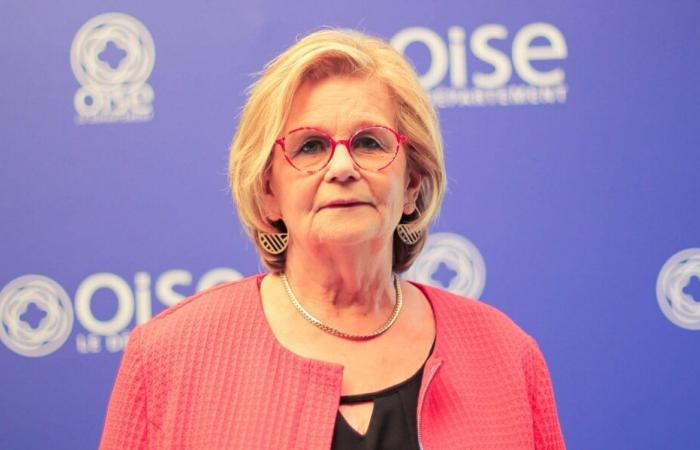As part of our magazine “Guide Seniors de l’Oise 2025”, Nicole Colin, vice-president of the Oise Departmental Council, responsible for the elderly and disabled people, agreed to answer our questions about the policy pursued by the Department in favor of seniors.
The strong axes of the Department's social policy
What are the strong points of the Department's social policy in favor of the elderly?
Social action is THE historical competence of the Department and its main mission. For more than 30 years, the law has confirmed aid and social action as the core competencies of the departments – decentralization laws of 1983, law of 2004 with the transfer of the RMI (Minimum Integration Income) which has since become RSA (Active Solidarity Income) and law of 2015. In this sense, the Department devotes numerous human resources to social policies – practically half of the Department's staff – as well as a budget representing more than 50% of the departmental budget. This makes the Department the reference institution in matters of solidarity and social cohesion.
Systems to support seniors and their families
Also, the Oise Departmental Council made seniors its major departmental cause in 2019 with the creation of dedicated systems – for example, the “Allô Oise Seniors” telephone platform and its internal advisors in the Department respond to all questions. requests from seniors and/or their families. The Senior Plan is integrated into our 2019-2023 departmental autonomy plan, which has been extended to 2024. The social themes at the heart of our thinking and action are the prevention of loss of autonomy and support at home. as well as the transformation of the offer for people with disabilities and the elderly.
Respond to isolation and improve access to social life
Action to improve access to social life is also one of our concerns, as isolation has an impact on accelerating the loss of autonomy. Our desire is to develop preventive actions to delay the loss of autonomy as much as possible or to limit its effects by working with local partners.
Thus, the departmental policies proposed for the elderly are part of a life course logic: our orientations respond to the needs of seniors who wish to live at home as long as possible, but also to the need for decent and safely.
In addition, it is necessary to have a suitable accommodation offer, accessible to all and which is of quality. To ensure this, our teams are vigilant and intervene with accommodation structures when necessary.
Likewise, we are working on diversifying the accommodation offer offered to seniors in the Oise with alternative solutions to isolated home life and collective life in establishments such as adult family care or even residential inclusive.
We will base ourselves on these themes to build our next departmental solidarity plan and set our departmental priorities.
The solidarity scheme
What is the Solidarity Scheme?
Leader of social solidarity, the Departmental Council organizes social and medico-social services, in accordance with the law. Thus, since the law of January 2, 2002, the Departmental Councils must adopt a Departmental Social and Medical-Social Organization Scheme in favor of the elderly and people with disabilities. As our plans expire between 2023 and 2024, we have decided to bring them together in a single Solidarity plan.
Work on our new Solidarity Scheme began in the fall of 2024 and will continue until the first quarter of 2025 with a view to a presentation by our President to the Departmental Assembly for adoption at the end of the first half of 2025.
The Departmental House of Autonomy: simplify and centralize
The Department's actions To build this new plan, which will guide us until 2029, we are calling on our agents, all of our institutional partners and, of course, user representatives. Creating a single Solidarity Plan 2025-2029 which brings together all of the community's social interventions, reflects our wish to have a road map which brings together the orientations of our social policy as well as an action plan which will strengthen the coherence, transversality and complementarity of departmental social systems and services for greater efficiency.
In addition and regarding the social policy of Autonomy, our Plan will take into account the aging of the population, which leads us to rethink our policies for aging well and supporting people to promote their autonomy.
Through the combined effect of the increase in life expectancy and the decline in fertility, the proportion of people aged over 60 will double by 2050: they will then represent almost half of the population. . Even more, the number of people over 85 will be tripled.
Our social policy in favor of the elderly will aim to respond to these priority issues, with the unwavering desire to make it possible to find the best responses to their needs and expectations in our territory. Our ambition is to ensure the conditions for a dignified and decent life and to guarantee this support and these responses adapted to everyone.
Objective: guarantee a dignified and adapted life for everyone
The Departmental House for Disabled People and the departmental services for personal autonomy become the Departmental House for Autonomy: what is the aim of this change? What are the expected results?
The law relating to the Adaptation of Society to Aging (ASV) of 2015 provides a framework for the creation of Departmental Autonomy Houses. The President of the Departmental Council can thus organize the sharing of missions for the benefit of dependent elderly people and people with disabilities.
A merger of services to simplify procedures
The Departmental Home for Autonomy (MDA) is a unique place where elderly people and people with disabilities and their caregivers can access information on the systems that concern them. In a logic of rapprochement, the services of the Departmental Council of Oise – the Directorate of Personal Autonomy – and the services of the Departmental House for Disabled Persons (MDPH) of Oise have grouped together to become on July 1 2024 the Departmental House of Autonomy – MDA.
Under the authority and leadership of our President, Madame Nadège Lefebvre, the merger of the two entities is the result of extensive consultation and work undertaken over the past two years. The ambition of this Departmental House of Autonomy was born from the desire to bring together these two fields of intervention, in order to facilitate procedures and care for the inhabitants of Oise.
Missions adapted to the needs of elderly and disabled people
But also, implement complementarity of public policies and partnership with all stakeholders, particularly in the medico-social sector. Also, this grouped and local organization makes it possible to address the public with disabilities and the elderly regardless of age or disability and to take into consideration all stages of their life journey.
The missions of the MDA are therefore to welcome, inform and guide people with disabilities, the elderly and/or their families; but also to examine all the requests submitted and to assess the needs according to each situation. The MDA will implement departmental autonomy policies and will also ensure all missions linked to the ESSMS – Social and Medical-Social Establishments and Services – falling within its exclusive competence (such as the Autonomy Residences or the Autonomy Services at Home providers concerning the Elderly Sector) or jointly (for example EHPAD, Establishment Accommodating Dependent Elderly People).
A new site for the Maison de l’Autonomie from 2025
During the first half of 2025, a second step will be taken with the move of the offices of the former Departmental House for Disabled People – located 1 rue des Filatures – to the premises of the Bénard building of the Departmental Council, located avenue de l'Europe in Beauvais.
Strengthened proximity thanks to Territorial Autonomy Services
In addition and with the aim of proximity to our audiences who may encounter mobility difficulties, it should be noted that the Departmental House of Autonomy (MDA) of Oise includes five Territorial Services for Personal Autonomy (STAP ) distributed across the department in ten Solidarity Houses (MDS). This distribution across the entire Department allows the geographical rapprochement of reception, information, guidance and assessment systems for the situation of people with disabilities and dependent elderly people.
Administrative support as close as possible to citizens
The Departmental Council Houses also provide support to elderly people, people with disabilities and/or their loved ones with withdrawals and submissions of files, but also help with filling out their administrative documents. Our objective is to offer a welcome, information and help as close as possible to our audiences' homes.
Read also: Senior Guide 2025: The Oise Departmental Council committed to its seniors with the Oise Seniors Plan
Find all the latest news about seniors in our special section.







